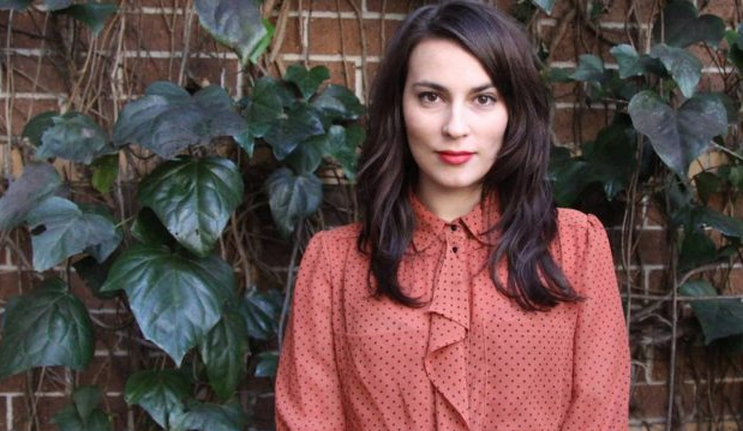
ALUMNI FOCUS
Award-winning playwright Kendall Feaver makes it big overseas
Macquarie alumna Kendall Feaver (BCreativeArts 2012) is an award-winning UK-based playwright. She grew up in Bowral, New South Wales, and attended Macquarie University, graduating in 2012 with a Bachelor of Creative Arts. She was a resident at Dunmore Lang College, one of the two residential colleges on campus at Macquarie in North Ryde.
Kendall has achieved many accolades for her debut play The Almighty Sometimes, recently winning the $25,000 Prize for Drama at the 2019 Victorian Premier’s Literary Awards.
The Almighty Sometimes premiered, to critical acclaim, at Manchester’s Royal Exchange Theatre in February last year. The Guardian, the Times and Telegraph gave the world premiere production four stars, praising the play as “sharply observed, drily funny and compassionate”, “heartbreaking and acutely alive” and a “powerful indictment of the modern-day desire to medicate”.
By the time The Almighty Sometimes played at Griffin Theatre in Sydney’s Kings Cross in August last year, it had already received a Judges Award at the 2015 Bruntwood Prize for Playwriting (the largest playwriting competition in Europe), Best New Play at the 2018 UK Theatre Awards, and earned Kendall a nomination for Best Writer in the UK’s The Stage Debut Awards.
In attendance at one of the performances were Dunmore Lang College’s Principal Dr Alasdair Murrie-West, Dean of Students Liza Allen and a number of current DLC students. “Her fascinating play is a profound and compelling study of a young woman’s attempt to discover where her mental illness and her identity transect,” said Dean of Students Liza Allen. “The play was directed by award-winning director, Lee Lewis and is a quick-witted and brutally honest comment on the difficult choices parents make for their children and the result once decisions are out of their hands. It’s an extraordinary play about mental health and the medication of children.”
Having moved from Australia, aged 22, to do a Masters in Playwriting at Goldsmiths, University of London, in 2012, Kendall spent five years interviewing psychiatrists, psychologists, parents and service users in the United Kingdom, United States and Australia about complex mental illness treatment in children and teenagers.
Kendall has been on attachment at the Bush Theatre, and twice at the National Theatre Studio. She has developed and presented work at Queen St Studios, Sydney; the Australian Theatre for Young People; Traverse Theatre, Edinburgh; Just So Festival, Cheshire; the Arcola Theatre, London; and Islington Youth Theatre, London. Kendall holds a Masters in Writing for Performance from Goldsmiths, University of London, which was supported with an Ian Potter Cultural Trust Award. She is currently under commission to Manhattan Theatre Club, New York, and is the writer (book and lyrics) of a new musical in development with the National Theatre, London.
Calling College Alumni
Did you attend Dunmore Lang College or Robert Menzies College? The colleges and university want to stay in touch with you to keep you updated on fun stuff like reunions, events and alumni stories, and to hear what you’ve been up to since graduating. Please update your details or contact us at alumni@mq.edu.au.
Playwright’s Notes on The Almighty Sometimes
I wrote the first draft of this play back in 2012, at a time when media headlines were preoccupied with a so-called medication ‘epidemic.’ My generation, Gen Y, had the dubious honour of being the most medicated in history, and young people who had been diagnosed with a mood and/or behavioural disorder in childhood or adolescence had now come of age. There was little to no research, however, on the long-term effects of psychotropic medications, or any suggestion of how many of these young people were continuing their treatment into adulthood, and I wanted to write a play from the middle of this developing fault line.
Plays – especially when they’re your first ‘proper’ one – can take a long time to reach the stage, and I was concerned that The Almighty Sometimes would lose its relevance while it waited for production. I needn’t have worried: Anna is now comfortably Generation Z, but rates of diagnosis have continued to rise across the world. The experience is far more common in her age group than it ever was in mine.
I spoke with many young people, parents, psychiatrists, psychologists, support workers, mental health advocates and critics as part of this project. A lot of frustration was voiced, a lot of anger and resentment, a lot of conflicting advice, and identity issues abounded – “what is me and what is my medication?” – but there were also many young people who’d had their lives undoubtedly saved by medical intervention. Every experience of mental illness is different, and it would be impossible to represent all within the scope of this play, but I do hope it goes some way towards exploring the experience of growing up with a label, and the huge and often fraught responsibility of being a parent, partner or mental health professional.
Beyond the research and the headlines, however, this is a play – first and foremost – about mothers and daughters: the bickering and the too-intense-familiarity, the lack of privacy or personal space, the belly-laughs, the life-lessons imparted (whether asked for or not!), the late-night vigils by the door, the swallowed injustices, the pain we sometimes inflict and the unconditional (and somewhat unfathomable) love we receive in return.
- Kendall Feaver